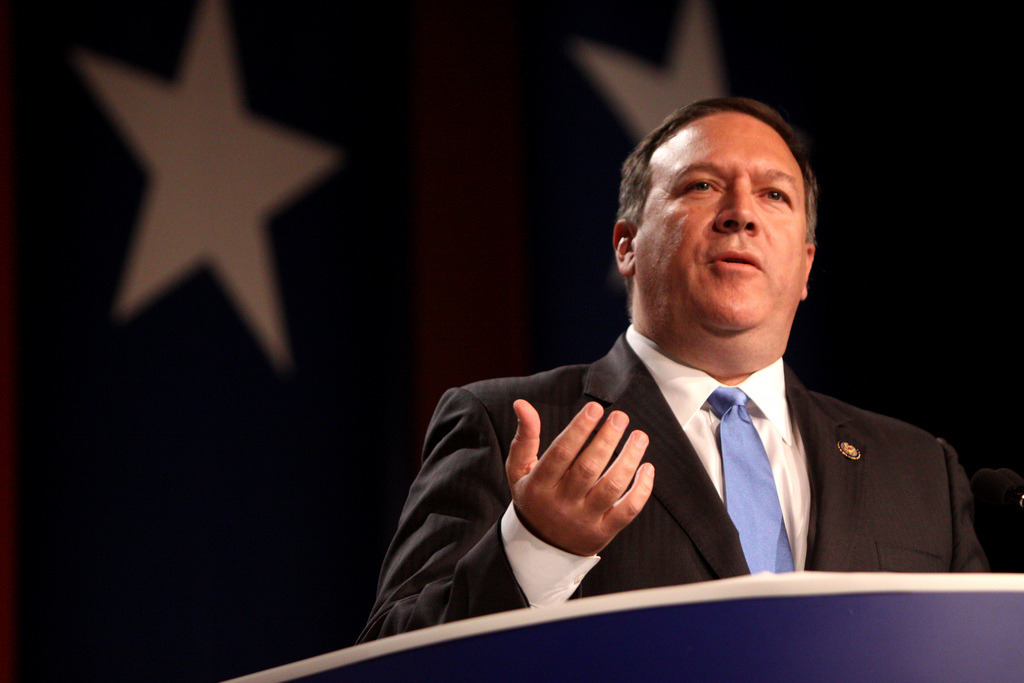
Photo Credit: Gage Skidmore
U.S. foreign policy is changing. With the selection of CIA Director Mike Pompeo to replace Rex Tillerson as secretary of state, President Donald Trump appears to be taking charge of his foreign policy. National Security Adviser H.R. McMaster and Defense Secretary Jim Mattis remain counsels of caution on many issues, but the former’s tenure could be short, and the latter might choose to exit if his advice has increasingly less effect.
Secretary Tillerson’s departure reflected both personality and substance. He and the president never established personal rapport. Last fall the secretary was reported to have called the president a “moron,” which suggested a relationship irreparably sundered. Moreover, the two disagreed on many, if not most policy issues: negotiation with North Korea, nuclear agreement with Iran, the dispute between Saudi Arabia/United Arab Emirates and Qatar, Russia, climate change, and free trade.
The outcome is likely to result in several course corrections, mostly in a more confrontational and hawkish direction. China in particular is more likely to become a target of the administration. That already has happened on trade, with Peter Navarro, more nationalist than economist, pushing for a trade war against virtually everyone, ranging from Europe and Mexico to South Korea and the People’s Republic of China. Although Pompeo is no protectionist, unlike Tillerson he probably won’t challenge his boss on the issue. After the administration announced its tariffs on aluminum and steel, Pompeo cited “trade or the theft of intellectual property” as areas where the administration was “pushing back against” the PRC.
On both Iran and North Korea, the CIA director disdained diplomacy. Indeed, he appeared to welcome possible regime change in Pyongyang, in contrast to Secretary Tillerson, who denied such an interest in an attempt to assuage North Korean concerns over giving up the regime’s missiles and nuclear weapons.
Secretary-designate Pompeo also appears to take a harsher attitude toward the PRC. Of course, Rex Tillerson suggested the possibility of interdicting Chinese ships in the South China Sea during his confirmation hearing. However, he took a more restrained and responsible stance once in office.
Nevertheless, Pompeo starts with a negative view of Beijing. Last year, regarding security threats, he said in one interview: “It’s hard to pick between China, Russia and Iran to be honest with you. I guess if I had to pick one with a nose above the others, I’d probably pick China.” He pointed to the PRC’s economic strength, population, and intellectual property theft. Moreover, he said, “I think it’s very clear when they think about their place in the world, they measure their success in placing themselves in the world where they want to be vis-à-vis the United States and not as against anyone else.”
He perceives a potentially dangerous rivalry between China and the United States: “It is also the case that the Chinese have moved to a place where they, I think, see themselves as a rival superpower.” Moreover, “They have as part of their mission to reduce the relative power of the United States vis-à-vis their own country.” Pompeo recently told the BBC that, “We have to do better pushing back against Chinese efforts to covertly influence the world.” He also emphasized the problem of Chinese espionage, obviously reflecting his position as CIA director.
He believes that administration pressure caused Beijing to shift its position on North Korea. Last August he praised the president: “We’ve seen the Chinese now say for among the first times that they believe the correct answer has to be a denuclearized peninsula. And that’s exactly the policy of the Trump administration.” Of course, the PRC has taken that position for years. Beijing has steadily, if sometimes erratically, backed ever-tighter economic sanctions against the Democratic People’s Republic of Korea. Administration pressure may have accelerated China’s willingness to act, but so did the speed-up of North Korean missile and nuclear testing. Unfortunately, Pompeo’s belief that administration action caused the PRC to cave could influence his future positions.
Shortly before being chosen as secretary of state he declared that “this administration has been very clear of pushing back against the Chinese threat.” More specifically, “If you look at the president’s national security strategy, it was very clear that what the Chinese are doing, whether that would be on trade or the theft of intellectual property or their continued advancement in East and South China Seas, this administration is prepared and engaged in pushing back against the Chinese threats so that we can have a good relationship with China in a way that the world desperately needs.” Alas, Beijing may not perceive these steps as an invitation to have “a good relationship.” CNBC’s Jim Cramer worried that Pompeo’s appointment “says to China you are our enemy.”
Pompeo was not uniformly negative about China. Last fall he praised its efforts regarding North Korea and said that “We think that President Xi will come out of this in a dominant position with incredible capability to do good around the world.” Whether he believes the Chinese president actually will do so is not so clear. Although the incoming secretary’s attitudes toward the PRC sound tough, they are not unusual. If U.S. policy shifts, it is likely to be in degree rather than in kind, as Pompeo reinforces rather than counterbalances the president’s views.
That almost certainly will be true elsewhere, such as Iran. The sanctions waiver comes up for renewal in May.
There is no similar deadline for China-U.S. relations, but there is no more important long-term issue. American analysts, pundits, and officials all have legitimate concerns about the direction of policy toward the PRC. However, it is important that Washington avoid treating Beijing as an enemy. Whatever the prospective secretary thinks of China, he must work to make the relationship work. Upon his and the administration’s success will depend peace and stability in East Asia.
